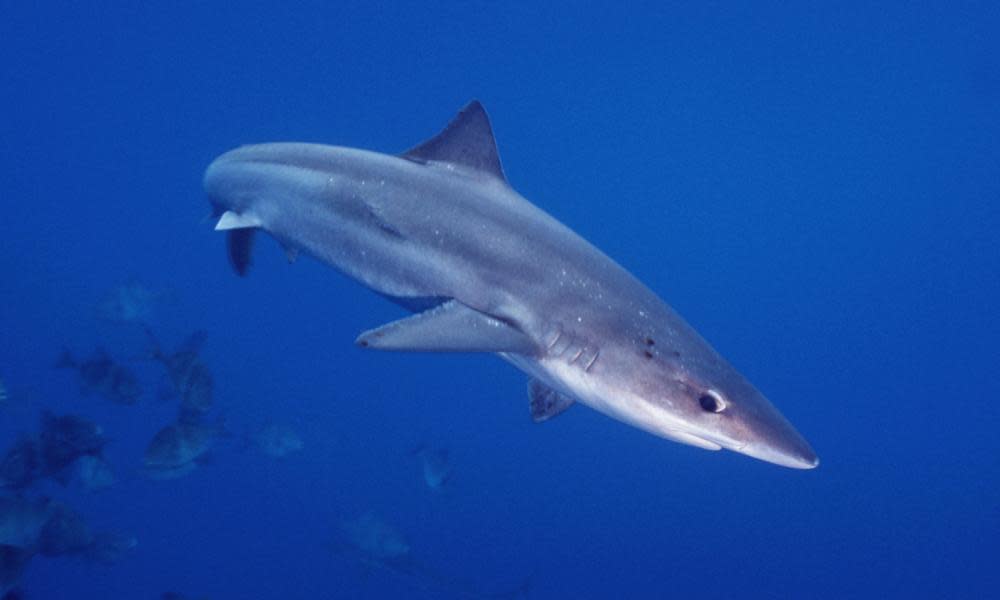School shark, sold as 'flake' in Australian fish and chip shops, listed overseas as critically endangered

A shark routinely sold in Australian fish shops has been listed as critically endangered by an international conservation body, prompting environmentalists to call for stronger protection of the species.
It comes as the government is due to release an interim report into Australia’s national environmental laws, the Environment Protection and Biodiversity Conservation Act.
The school shark, whose meat is often sold as “flake” – the generic name for shark meat – was designated critically endangered last week by the International Union for Conservation of Nature (IUCN).
Related: Endangered Australian fish being sold in shops and restaurants
In Australia, the species is listed in a special category known as “conservation dependent”, which allows otherwise endangered species to continue to be commercially traded.
“It’s a quirk in our national laws that prioritises commercial exploitation and economic drivers over environmental ones,” said Leonardo Guida, a shark scientist and spokesman for the Australian Marine Conservation Society.
“We stopped harvesting whales for that very reason. Why is it different for a shark? Why is it different for a fish?
“There is no reason why any animal that has had a 90% decline in modern times should still continue to be harvested.”
Guardian Australia has previously reported on the eight species, all marine animals, which are listed as conservation dependent despite qualifying for stronger protection under the act.
The species include the blue warehou and the scalloped hammerhead, which the IUCN also lists as critically endangered.
Under Australian laws, had the school shark been given the endangered listing it qualified for, it would be classified as a “no-take species”.
There is no reason why any animal that has had a 90% decline in modern times should still continue to be harvested
Shark scientist Leonardo Guida
The government has banned targeting of the school shark but, under its conservation-dependent listing, it can be legally caught as bycatch, which occurs predominantly in gummy shark fishing operations in Australia’s largest fishery, the Southern and Eastern Scalefish and Shark Fishery.
School sharks are found globally in temperate waters, including off Australia, New Zealand, South America and South Africa.
Since being officially declared overfished in 1990, the population of school shark in Australia has crashed to around 10% of its original numbers.
Earlier this year, countries voted to list the school shark on the Convention on the Conservation of Migratory Species (CMS) appendices – an international agreement that aims to build cooperation between countries for the conservation of migratory species.
Related: Australian government stops listing major threats to species under environment laws
In a vote, Australia was the only country to oppose listing the shark under the convention.
The environment department said the government had opposed the move because research indicated the population found in Australian waters “does not regularly migrate outside of Australian waters, and as such, does not meet the CMS definition of migratory”.
A spokesman added that the process used by the IUCN to list the species as critically endangered differed to the process used under Australia’s EPBC Act.
“A fundamental difference between the two processes is that the IUCN Red List assessment is a global assessment and may be influenced heavily by population declines outside Australian waters.”
He added that stringent measures were in place for school shark populations under the conservation-dependent listing.
But the threatened species scientific committee has told the review of Australia’s environment laws that the conservation-dependent category needs urgent reform and that it masks the actual conservation status of a species.
The AMCS and other conservation groups have argued the category should be scrapped and species given the protection they qualify for.
The chair of the review, the former competition watchdog head Graeme Samuel, delivered his interim report to the environment minister, Sussan Ley, two weeks ago.
Related: Sustainable seafood: how to navigate the fish market this Christmas
Lawrence Chelbeck, a marine biologist with Humane Society International, said the IUCN listing should prompt the government to put forward the school shark for reassessment for stronger protection.
He said species listed as conservation dependent had not shown the level of recovery that listing as a nationally protected species should deliver.
“We suspect the value of the school shark as byproduct is the real reason for the government’s stance and not whether it’s migratory or not,” he said.
“Endangered species should be protected from commercial exploitation regardless of value.”


